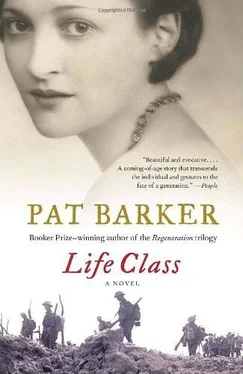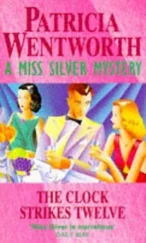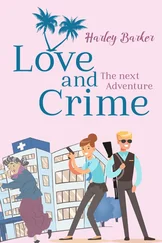That speech, which should have sounded priggish, but didn’t, because his enthusiasm and energy kept bursting through, confirmed her liking for him. More than liking, perhaps. Attraction. He was attractive, in spite of his freckly skin and staring hair. He didn’t look human, not entirely human. Ariel. That’s who he was. She smiled as she sat down at the café table and looked across at him. Ariel and Miranda.
She suggested a carafe of red wine while they waited. He hardly seemed to know what to do and kept looking at the door hoping salvation in the shape of Paul might suddenly appear. When the wine had been brought to the table and poured, she asked, ‘Do you think you’ll get your ambulance?’
‘I don’t know. We keep nudging them.’
We. Evidently this had become a joint project.
‘Nurses are coming out all the time now. Proper nurses, so you never know, we might be lucky. Anyway’ he raised his glass. ‘To happier times.’
He was happy now, and because of the times, not in spite of them.
‘Didn’t you ever think of enlisting?’
He flushed, perhaps suspecting her of being about to produce a white feather. Little did he know.
‘No, I’m a Friend. It wasn’t an option.’
‘A Friend?’
‘A Quaker. We oppose all wars.’
‘Because Jesus said so?’
‘Yes — and because the inner light leads us in that direction. I know, that probably strikes you as —’
‘Doesn’t strike me as anything, particularly. I don’t think I have the right to judge other people’s decisions. I’m a woman. Nobody’s asking me to fight.’
‘And you don’t want to … nurse?’
‘Good God, no.’
‘So what do you do?’
‘Ignore it — as far as I can.’
‘And how far is that?’
‘Not very far, because there’s Paul, and there’s my brother who’s joined the army. And I’ve got a German friend whose father’s just been interned. But I keep working. Painting,’ she explained, to cut off the question.
‘Landscapes, Paul says.’
‘Quakers pray in silence, don’t they?’
She couldn’t have done that, not that she prayed much at all. But to lose the vaulted aisles, the stained glass, the music, the words of the Book of Common Prayer and put nothing in its place except silence and other people’s faces and tummy rumbles. God, no.
‘Yes, we have a meeting at the hospital every Sunday morning. Paul joins us now and then.’
So, added to the image of Paul expertly winding bandages around amputated stumps, she had to try to imagine him sitting in a hut in silence, surrounded by earnest, well-meaning — but surely rather dull? — men. Women too, presumably — all excellent people, no doubt. But Paul ?
At that moment, as if summoned by her incredulity, Paul appeared in the doorway and began threading his way between the tables. As he bent to kiss her, she smelled the cool night air on his cheek, overlaying, without hiding, the hospital smell of disinfectant and blood. He nodded to Lewis, picked up the carafe and caught the waiter’s eye, before sitting down. Silently she passed her own almost full glass across to him. He looked slightly embarrassed, but took it nevertheless.
‘Cheers,’ he said, toasting them both, but nothing could hide his need for that first glass.
She went on talking to Lewis, aware all the time of Paul, of the colour coming back into his face. She could see Lewis was concerned. We’ve a lot in common, she thought. We’re both in love with Paul. Three months ago, she wouldn’t have thought to use those words.
A waitress, with a white cloth tied round her waist, came up to the table. She was invisible to them, standing there with a pad and pencil in her hand, but then, when Paul looked up to give the order, she said, ‘I haven’t seen you here for a long time.’
‘No.’ He’d flushed slightly. ‘I’ve been busy.’
‘And you too, Monsieur Lewis. You have been too much occupied, I think?’
Lewis agreed that he had been too much occupied. After she went, there was an awkward pause, and then Lewis and Paul both rushed in to break it, frustrating each other’s efforts. Elinor stared down into her glass, realized she didn’t care — she ought to care, but she didn’t — and then she started to smile, and then to laugh.
Paul stared at her in amazement. ‘What’s funny?’ He sounded irritable, resentful even.
‘Nothing. I’m just happy to be here.’
They ate some spicy sausages with potatoes. Paul looked even more tired than he had the night before and contributed little. Elinor talked about the things she’d seen and done that day, the places she’d sketched, and they asked about home, about London. Had it changed much? No. The searchlights were beautiful, there was a huge gun on Hampstead Heath, all the lamps were painted blue. The worst thing was the gutter press — always going on about ‘the enemy within’. Lewis asked about the Slade, what was it like now? A convent, she said. A nunnery. A herd of sheep with Tonks the only ram, but she kept faltering into silence.
Paul burst out that when he looked back on those days now he thought they’d all been barking mad.
‘No,’ she said. ‘ This is mad.’
‘Well, all right.’ He was tapping his fingers on the table. God, he was bad-tempered. ‘Perhaps not mad, but like children. Spoiled, self-indulgent, selfish children.’
‘And this is better? Young men in wheelchairs. Or dead.’
‘At least it’s not contemptible.’
‘And we were?’
‘Weren’t we?’
She shook her head. Lewis tried to change the subject, and from then on she concentrated entirely on him, asking him about his schooldays — not long past — and his ambitions for the future. He wanted to play the piano, he said, professionally, but he didn’t know if he was good enough. If he couldn’t do that, he’d teach.
‘Music?’
‘Oh, yes — I don’t know about anything else.’
It had been a warm day — perhaps the last day of the long Indian summer. It couldn’t go on much longer, they were into November now — and the café was airless. She seemed to be breathing in the same breath over and over again. And the candles didn’t help.
When the rumbling started, she thought: thunder. Good. She’d always loved storms. She imagined them lying on the bed with the curtains open, blue flashes lighting up their bodies; and they wouldn’t need to talk, and perhaps that was just as well. Then she became uneasy. Paul and Lewis were staring at each other, not alarmed, just puzzled.
‘That was close,’ Lewis said.
Then the candles guttered and the whole room shook and from the look on people’s faces she realized it wasn’t thunder.
Paul had gone white. ‘It’s a stray. Has to be.’
But even as he spoke there was another crash and everything on the table did a little jump into the air. The light bulb was swinging at the end of its flex, sending shadows from side to side. All the people in the room seemed to be clinging to the clapper of a bell. The electric light flickered again, only it was more than a flicker now. A long, fierce, edge-of-darkness buzzing and then the lights went out. The candles, which were really no more than ornaments, wobbled but kept going, giving just enough light to show people’s faces and hands. What Elinor remembered afterwards was the inertia. Nobody moved. They couldn’t believe it had happened; they didn’t want to abandon their nice meals and their bottles of wine, and so they all just sat there, staring at each other, until another thud, closer, brought with it the sound of breaking glass.
Scraping chairs, screams, panic. Paul grabbed her and dragged her towards the door. Lewis was just behind them, treading on their heels. Outside in the dark people were running all in different directions, but Paul stood on the pavement with his hand gripping her upper arm. She wanted to run too, though there was no point running from danger that struck randomly from the air.
Читать дальше












